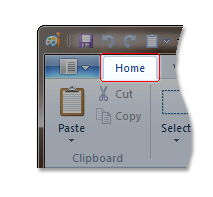Tab (Windows Ribbon Framework)
A Tab contains groups of related controls.
Details
There are three types of Tab in the Ribbon framework.
| Type | Description |
|---|---|
| Core tab | Core tabs that organize the default functions of the application. |
| Contextual tab | Tabs that are displayed during specific document or workspace states. For example, if a user selects a particular object type, such as an image contained in the header of a table, then various contextual tabs might be displayed that expose both table and image functionality. |
| Modal tab | Core tabs that are displayed during a specific document or workspace application mode, such as print preview. |
The following screen shot shows a core Tab from Windows 7 Paint.

Tab Properties
The Ribbon framework defines a collection of property keys for the Tab control.
Typically, a Tab property is updated in the ribbon UI by invalidating the Command associated with the control through a call to the IUIFramework::InvalidateUICommand method. The invalidation event is handled, and the property updates defined, by the IUICommandHandler::UpdateProperty callback method.
The IUICommandHandler::UpdateProperty callback method is not executed, and the application queried for an updated property value, until the property is required by the framework. For example, when a tab is activated and a control revealed in the ribbon UI, or when a tooltip is displayed.
Note
In some cases, a property can be retrieved through the IUIFramework::GetUICommandProperty method and set with the IUIFramework::SetUICommandProperty method.
The following table lists the property keys that are associated with the Tab control.
| Property Key | Notes |
|---|---|
| UI_PKEY_Label | Can only be updated through invalidation. |
| UI_PKEY_Keytip | Can only be updated through invalidation. |
| UI_PKEY_TooltipDescription | Can only be updated through invalidation. |
| UI_PKEY_TooltipTitle | Can only be updated through invalidation. |
Related topics